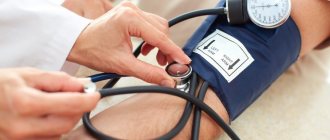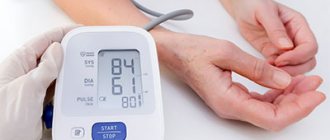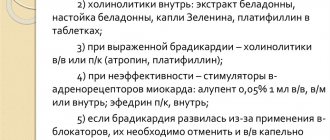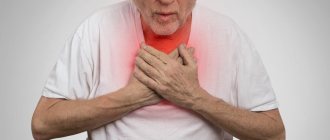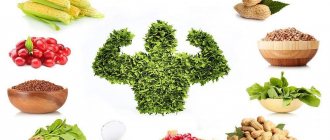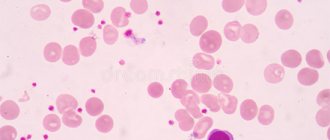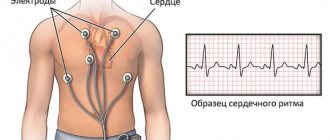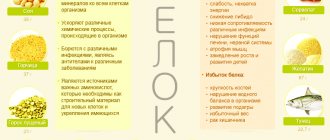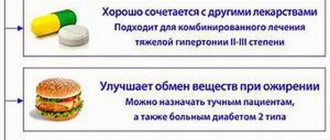- dizziness, weakness, fatigue, decreased performance, drowsiness, decreased memory, slowed reaction, decreased concentration, headaches;
- feeling of heartbeat, chilliness of the extremities;
- pallor, sweating, nausea;
- pain in the neck and upper shoulder girdle, lower back, in the heart area; hearing disorders (hearing impairment, noise or crackling in the ears);
- visual disturbances (blurredness, increased variegation, loss of color perception, narrowing of visual fields, final loss of vision).
- in conditions that are accompanied by a decrease in the volume of blood circulating in the body (bleeding, diarrhea, vomiting, excessive sweating in hot weather);
- after eating (postprandial syncope), due to the accumulation of blood in the veins of the gastrointestinal tract;
- for diseases affecting the structures of the central and peripheral nervous system (Parkinson's disease, Alzheimer's disease, diabetes mellitus);
- when standing for a long time, especially in a stuffy room, when experiencing pain, fear (fear of blood), during medical procedures.
- regular moderate physical activity with stress on the muscles of the legs and abdomen (especially swimming);
- wearing compression stockings on the legs and a bandage on the stomach (for older people);
- consumption of a sufficient amount of table salt (up to 10 g/day) and water (up to 3 l/day) provided there is no arterial hypertension;
- rest after eating in a sitting or lying position for 1-2 hours (for postprandial fainting);
- discontinuation or dose adjustment of medications that lower blood pressure;
- giving up alcohol;
- avoidance of heavy lifting, excessive physical effort,
- refusal to stand for long periods of time;
- Avoiding prolonged exposure to hot water, such as hot showers and spa treatments.
Do fainting occur with low blood pressure?
Why does this happen and what to do about it? – Yes, one of the mechanisms of fainting is precisely a sharp decrease in pressure. This often occurs when the body changes position from horizontal to vertical (orthostatic syncope) due to the rapid accumulation of blood in the veins of the legs, decreased filling of the right ventricle of the heart and further dilation of blood vessels.
Normally, a person has mechanisms for quickly adapting blood pressure and heart rate (HR) to changes in body position in order to maintain a more or less constant level of blood supply to the brain.
In a healthy person, in response to a decrease in blood pressure, blood vessels narrow and the heart rate increases. When this mechanism is disrupted, the vessels, on the contrary, dilate, and blood pressure decreases even more - blood flow to the brain decreases, and fainting occurs.
This mechanism of fainting occurs:
The trigger may be coughing, laughter, defecation or urination, turning the head or pressure in the neck (carotid sinus syndrome), for example due to tumors, when wearing narrow collars.
Such fainting is classified as reflex; they are quite favorable, but can be dangerous due to injuries sustained during a fall, especially in older people. Lifestyle changes can often help reduce the risk of fainting and hypotension.
In this case, a person should avoid exposure to possible triggers and provoking situations. And a quick drink of cold water in a volume of 200-400 ml helps prevent postprandial and orthostatic fainting.
Also useful:
What low blood pressure is considered life-threatening?
– Life-threatening blood pressure levels may vary for each person and situation.
When blood pressure is below 90/60 mmHg. Art. Most people experience neurological symptoms: dizziness, lightheadedness and fainting. When systolic blood pressure is below 80 mm Hg. Art. the kidneys stop performing their filtration function, shock develops.
But, for example, in hypertensive patients with initially high blood pressure, a sharp and rapid decrease in blood pressure can cause loss of consciousness and even ischemic stroke (with a systolic blood pressure of 100–110 mm Hg). But people of asthenic physique with low body weight (constitutional hypotension) with a blood pressure of 90/60 mm Hg. Art. can feel great.
Preparations with herbal ingredients
And there is also a group of drugs that increase blood pressure, based on components of plant origin. What can you take from this group of medications? The list of medications is quite extensive and includes:
- Chinese lemongrass;
- Eleutherococcus;
- lure tincture;
- ginseng tincture;
- tincture of radiola rosea;
- pantocrine
Adaptogens are plant components that are used to increase blood pressure.
Chinese lemongrass
The product is part of a group of drugs that have tonic and adaptogenic properties. Its use helps to increase blood pressure. It is forbidden to drink the tincture if the following conditions are diagnosed:
- acute period of any disease;
- hypertonic disease;
- pathologies of the heart, blood vessels, liver;
- disturbances in the functioning of the central nervous system;
- epilepsy, tendency to seizures;
- traumatic brain injuries;
- severe overexcitation of the central nervous system, accompanied by insomnia;
- mental disorders;
- allergy to the components of the product.
The tincture must be taken in a course. Its duration is two weeks.
Eleutherococcus
In the treatment of hypotension, a liquid infusion from the roots of the plant is used. The plant is widely known for its restorative, tonic and adaptogenic effect. The product improves mental abilities, performance, memory, vision, and also enhances immune defense and overall tone of the body.
The tincture can be used for both medicinal and preventive purposes. In the latter case, you need to drink 20 drops twice a day. If it is necessary to carry out a course of treatment, the dosage is increased to 30 drops, and the frequency of administration is 3 times a day.
Important! The tincture should be taken after meals.
The duration of treatment is 15–30 days. Then you need to take a two-week break and repeat the dose if necessary. If the duration of therapy is more than two calendar months, then the development of side effects is possible.
Treatment of hypotension
These include increased irritability, poor performance, increased blood pressure, sleep disturbances, increased anxiety, impaired digestion, and weight gain.
Eleutherococcus tincture should not be taken in the evening. Otherwise, the development of insomnia is possible. And also, hypertensive patients should avoid using the drug, since it helps to increase blood pressure.
Signs of overdose: disturbances in the digestive system, insomnia, poor performance, allergic reaction. If such conditions occur, the drug should be stopped. If necessary, symptomatic therapy can be carried out.
Tincture of enticement
Tincture based on bait is used not only in folk treatment. It is also recognized by traditional medicine. The drug has general strengthening and adaptogenic properties. Course use of the drug helps to increase blood pressure and overall body tone, restore reserves of vitamins and microelements.
The main indications for use of the tincture are:
- asthenic conditions;
- hypotension;
- vegetative-vascular dystonia.
It is necessary to drink the drug in the first half of the day, as it has a powerful tonic effect. The latest hour before which you can drink the tincture is 6 pm. The total duration of the course is a full calendar month.
The daily dosage is calculated individually and depends on the desired result.
Ginseng tincture
What else can you drink if you have hypotension? Tincture based on ginseng root has proven itself well. It has a general tonic effect and is recommended for use in cases of hypotension, asthenia, neurasthenia, etc. The composition should be taken three times a day, half an hour before meals. Single dosage – 40 drops.
During treatment, the development of the following side symptoms is possible:
- headache;
- attacks of nausea, vomiting;
- sleep disturbances due to a strong tonic effect;
- increased nervousness;
- tachycardia;
- diarrhea;
- allergic reaction;
- nervous overexcitation;
- nosebleeds.
The use of the tincture should be avoided in childhood and during the period of bearing/breastfeeding a child.
Rhodiola rosea tincture
Rhodiola rosea has powerful adaptogenic properties. Take the product 30 minutes before meals twice a day. A single dose is 20 drops. The duration of the course is a full calendar month.
Pantocrine
The drug is a biological stimulant, the basis of which is the extract of forest deer antlers. Dosage regimen: 1 tablet per day. The duration of the course is two weeks.
Herbal-based drugs that raise blood pressure cause much less harm to the body and central nervous system than drugs of chemical origin. In addition, they can be taken exclusively for preventive purposes.
Hypotension is no less serious a disease than hypertension and also requires treatment. But before starting to take any medications, it is necessary to find out the cause of the pathology by contacting a specialized specialist.
Is it possible to raise blood pressure on your own at home?
– At home, in order to raise blood pressure, you can drink tea or coffee, eat something salty, and quickly drink 1-2 glasses of cold water (with ice in large sips).
You can also use so-called physical counterpressure maneuvers: crossing your legs in combination with maximum tension in the muscles of the legs, abdomen and buttocks; maximum squeezing of the rubber ball in the hand; squeezing one hand with the other with gradual abduction of the hands (phalanxes of the fingers in a lock in front of the chest).
All this is done with effort, muscle tension for as long as possible, until the symptoms disappear completely.
What foods can help with low blood pressure, and which ones should not be consumed?
– For low blood pressure, as I said earlier, it is recommended to consume large amounts of table salt (up to 10 g/day) and liquids (up to 3 l/day), and caffeine-containing drinks.
With postprandial hypotension, you need to adhere to a certain type of diet: eat often, in small portions, more proteins and fats, avoid carbohydrates (especially refined ones), eat warm or cold (not hot) foods. And you should give up alcohol.
In what situations should you definitely consult a doctor – and which one? – Patients with fainting, especially those that occur for the first time, need to consult a cardiologist, and, if necessary, a neurologist.
If blood pressure was previously normal or elevated, and then became chronically low, you should also contact a cardiologist to find out the cause. How to monitor your blood pressure and control its reduction?
– In order to prevent another decrease in blood pressure, it is necessary, firstly, to determine the cause (hypothyroidism, anemia, adrenal insufficiency, taking high doses of antihypertensive drugs, etc.) and, if possible, eliminate it.
Secondly, try to avoid provoking situations and factors, observe safety conditions during verticalization, and lifestyle recommendations.
And in situations where a person anticipates developing hypotension or fainting (increased sweating, nausea), you can help yourself by using the physical counterpressure maneuvers that I described earlier.
Medicines for high blood pressure
Low blood pressure (hypotension, vegetative-vascular dystonia) is a pathological condition of the body, which is accompanied by a decrease in blood pressure. The cause of the disease is a decrease in muscle tone in the walls of the arteries. What medications increase blood pressure?
Plant adaptogens
Herbal preparations have a mild stimulating effect on the central nervous system and cardiovascular system, help fight drowsiness, physical and mental fatigue, and effectively increase blood pressure. Example of plant adaptogens:
1. Eleutherococcus senticosus extract can be taken together with ascorbic acid.
2. Herbal tinctures:
- Aralia,
- Ginseng,
- Lures,
- Schisandra,
- Rhodiola.
3. Pantocrine is a natural drug in tablet form.
4. Saparal is a medicine based on the roots of Manchurian Aralia.
5. Caffeine in tablet form.
Alpha adrenergic agonists
Drugs in this group are prescribed to patients with orthostatic disorders, hypotensive crises and fainting:
1. Mephentermine is effective for hypotension and orthostatic disorders.
2. Midodrine (Gutron, Midamin) is a medicine for increasing blood pressure that stimulates alpha-adrenergic receptors. The drug constricts blood vessels, preventing stagnation of blood in the veins. As a result, the flow of oxygen to tissues improves, and the volume of circulating blood remains at a constant level.
3. Norepinephrine (Norepinephrine) – solution for intravenous administration. It has an adrenergic stimulating effect and constricts blood vessels. Used for low blood pressure after injuries, poisoning, operations, and cardiogenic shock.
4. Phenylephrine (Mezaton, Irifrin, Vistosan) – solution for injection, acts gently, constricts arterioles. Used for vascular insufficiency and shock conditions.
Drugs to stimulate the nervous system
Drugs that stimulate the central nervous system increase blood pressure, stimulate mental and physical activity, reduce fatigue and drowsiness, increase concentration and improve memory:
1. Adrenomimetics of indirect or combined effects:
- Caffeine sodium benzoate.
2. Analeptic drugs that affect the vasomotor and respiratory centers in the brain:
- Acrinor increases cardiac output without increasing the number of heart contractions, resulting in a sustained and prolonged rise in blood pressure.
- Nicetamide (Cordiamin).
- Symptol is a mild medicine to increase blood pressure.
- Etimizole.
- Effortil (Etilephrine) – constricts blood vessels, increases the volume of circulating blood.
3. Analeptics – drugs acting at the level of the spinal cord:
- Alkaloid.
- Angiotensinamide (Hypertensin) is a drug that is administered intravenously through a dropper. Activates the release of epinephrine and aldosterone.
- Securinin.
4. Anticholinergic drugs:
- Bellaspon,
- Bellataminal is used for disorders of the vagus nerve.
Other drugs
The following drugs are also used to increase blood pressure:
- Heptamil (Heptazol, Heptanal) is a non-toxic, effective medicine in the form of tablets and solution for injection and intramuscular administration. The drug develops the tone of the cardiovascular system and stimulates coronary blood flow.
- Niketamide (Cordiamin, Cordiamid, Tonocard, Cordimid) is an analeptic drug available in the form of drops and injection solutions. Stimulates the central nervous system, stimulates the respiratory and vasomotor centers in the brain. It affects the body in two directions: central and peripheral.
- Citramon is a popular medicine for high blood pressure, containing caffeine, paracetamol and acetylsalicylic acid. The drug thins the blood and has a positive effect on blood circulation, as a result of which the body begins to receive more oxygen.
- Ephedrine is a sympathomimetic drug, available in the form of tablets, nasal drops, and injection solutions. Increases blood glucose concentration and muscle tone, stimulates the central nervous system.
Related products View all products
Aquacitramon, gran.
for oral administration 3 g No. 5 RUB 138.00
More details
Askofen-P, tab. No. 10
31,50 ₽
More details
← Previous article Medicines for lactation
Next article → Medicines for the gallbladder
